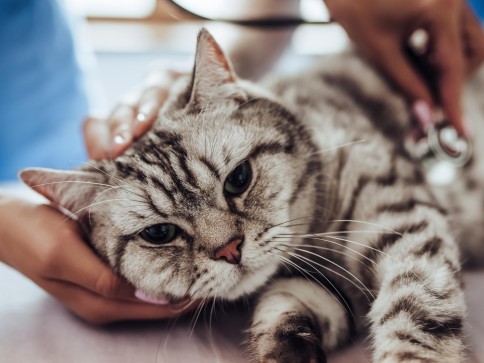Vaccine Awareness

Vaccinating our pets is a vital part of maintaining their health and wellbeing and has helped to significantly reduce the incidence of many life-threatening diseases in the UK pet population. As well as protecting the health of our pets, vaccination is important for preventing the spread of some zoonotic infections (infections which can be passed to humans) such as Leptospirosis.
Vaccines work by exposing the immune system to a component of a virus or bacteria which stimulates the production of antibodies and activation of immune cells. Antibodies are produced by the body to help fight infection. The antibodies and immune cells (like T-cells) resulting from vaccination remain in the body and are able to help fight off the specific infection if the animal is later exposed to it. The level of protection gradually declines over time and regular re-vaccination isrecommended to maintain effective levels of protection.
WHAT VACCINES SHOULD MY PET HAVE?
DOGS
We advise that all dogs are routinely vaccinated against Canine Distemper,Canine Infectious Hepatitis, Canine Parvovirus and Leptospirosis.
Distemper and Infectious Hepatitis are much less prevalent in the UK pet dog population than they were historically, thanks to the success of widespread vaccination, however, they continue to pose a significant risk to unvaccinated dogs.
Parvovirus outbreaks are still common in the UK, causing severe vomiting, diarrhoea and dehydration in unvaccinated dogs. Puppies are especially vulnerable and will often die from the illness, sometimes even despite rapid and intensive treatment attempts.
Leptospirosis is a bacterial infection which damages vital organs such as the liver and kidneys and is frequently fatal. Infection is often associated with contact with wild rodents or water contaminated by their urine. It is also a zoonotic disease, meaning that it can cause disease in humans as well as animals, and is the cause of Weil’s disease in humans. There are several strains of Leptospirosis and the vaccines we use protect against the most common strains present in the UK.
In addition to these essential vaccinations, we also recommend vaccination against Kennel Cough, an infectious upper respiratory disease. This is particularly important if your dog is likely to be mixing closely with other dogs such as in a kennel environment or training classes, as these environments increase the risk of spread. This vaccine provides protection against Canine Parainfluenza virus and a bacterial infection called Bordetella bronchiseptica, both of which can cause Kennel Cough. Vaccinated dogs can still become infected, although they are usually much less unwell than unvaccinated dogs.
CATS
It is advised that all cats are vaccinated against the ‘cat flu’ viruses Feline Herpesvirus and Feline Calicivirus, and against Feline Parvovirus (also known as Feline Panleukopenia Virus) which causes Feline Infectious Enteritis
Herpesvirus and Calicivirus both cause upper respiratory disease with discharge from the eyes and nose, sneezing and mouth ulcers amongst other symptoms and can result in long-term or recurrent respiratory problems.
Feline Parvovirus causes suppression of the immune system and severe vomiting and diarrhoea in unvaccinated cats and is often rapidly fatal. It can also cause problems with brain development in unborn kittens if the mother is infected.
We also advise vaccinating most cats against Feline Leukaemia Virus, an infectious cause of immune suppression and cancer in cats. This is especially important for outdoor cats and multi-cat households as the infection is spread by direct contact with other cats and sharing of items such as food bowls and litter trays.
RABBITS
We recommend vaccinating all pet rabbits against three main infectious diseases: Myxomatosis, Rabbit Haemorrhagic Disease 1 and Rabbit Haemorrhagic Disease 2. These viral infections are frequently fatal and highly contagious.
Myxomatosis causes swelling and crusting lesions around the face and genitals, discharge from the eyes and nose, breathing problems and loss of appetite. Treatment of unvaccinated rabbits is rarely successful. Vaccinated rabbits can sometimes still contract Myxomatosis infection, however, symptoms are usually much milder and their likelihood of survival much higher. In unvaccinated rabbits, this disease is almost always fatal; if vaccinated, rabbits will usually recover.
Both Rabbit Haemorrhagic Disease 1 and 2 cause internal and/or external bleeding (haemorrhage), often resulting in rapid or sudden death and there is currently no treatment available.
HOW OFTEN DOES MY PET NEED TO BE VACCINATED?
It is advised that dogs, cats and rabbits are re-vaccinated annually in order to maintain an effective level of protection. However not all components of the vaccination programme will be given every year. Your vet will work out which vaccines your pet needs based on their age, vaccination history and the recommended intervals between vaccinations. For example, adult dogs require re-vaccination for Leptospirosis and Kennel Cough every year, however they only need to be re-vaccinated for Distemper, Hepatitis and Parvovirus once every three years.
We are dedicated to preventative healthcare and include all of these recommended vaccinations in our Health Plan – the Chalkland Elite Club – as standard to ensure your pet is protected.
Categorised in: News


